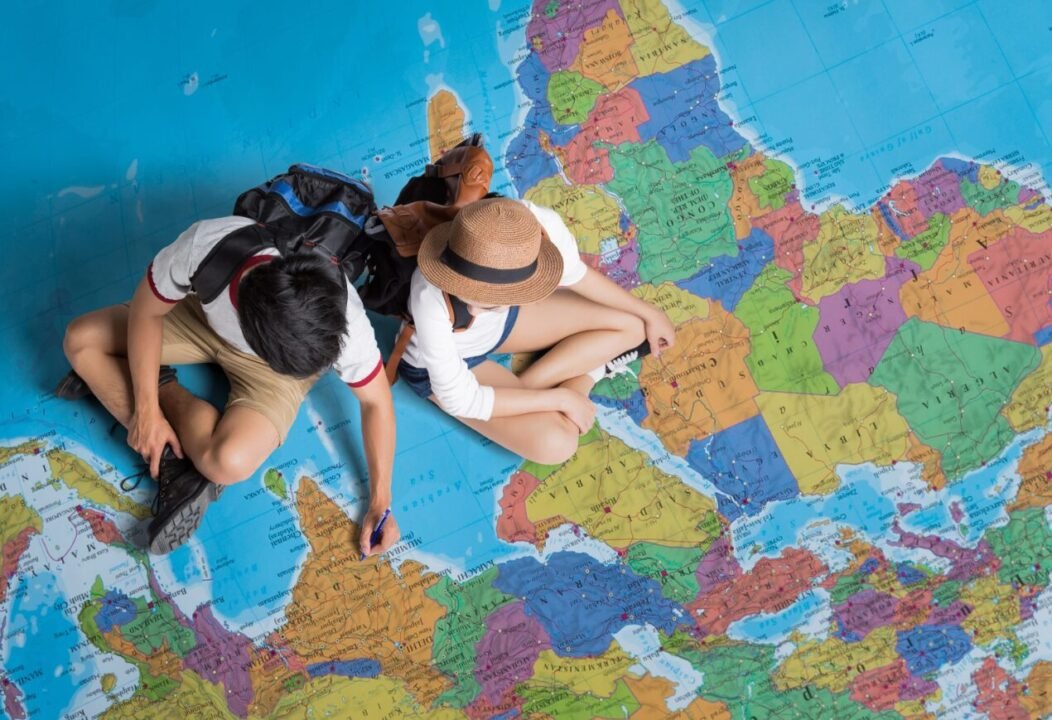Have you ever pondered the existence of these enigmatic micro-nations?
Discover the clandestine domains of Sealand and the Kingdom of Redonda, each with a tale as intriguing as its sovereignty.
From the icy expanse of the Grand Duchy of Flandrensis to the imperial aspirations of the Empire of Austenasia, these diminutive yet potent entities beckon you to delve further into the enthralling world of micronationalism.
A realm of mystery awaits, where power dwells not in size but in the resilience and audacity of these small yet formidable nations.
Sealand: The Principality of the Sea
Sealand stands as a unique and intriguing micro-nation, known as the Principality of the Sea.
Established on an old World War II sea fort off the coast of England, its legal status has been a subject of debate. Despite claiming independence in the 1960s, Sealand’s sovereignty hasn’t been widely recognized.
This lack of formal recognition hasn’t deterred the principality from asserting its autonomy and self-governance.

In terms of military defense, Sealand has shown a determination to protect its territory. The principality has its own flag, national anthem, and even a defense force.
This defense force played an important role in repelling attempted invasions in the past, showcasing Sealand’s commitment to safeguarding its sovereignty.
While Sealand’s legal status may remain uncertain in the eyes of many, its resolve to uphold its autonomy through military defense highlights the principality’s unwavering dedication to freedom and self-determination.
Molossia: A Quirky Sovereignty
Nestled in the heart of Nevada, Molossia stands as a peculiar yet fascinating micro-nation with a distinct sense of sovereignty.
This tiny nation, spanning just 1.3 acres, boasts quirky customs that set it apart from traditional states. Molossia’s founder, Kevin Baugh, established the nation in 1999 as a sovereign entity with its own set of rules and regulations.
One of the most intriguing aspects of Molossia is its unique government structure. The nation operates as a constitutional republic, with President Baugh serving as both head of state and head of government.
Molossia’s government oversees a range of affairs, from issuing its currency, the Valora, to maintaining its own postal service.
Despite its small size, Molossia prides itself on upholding its sovereignty and independence. Visitors are welcomed to explore this quirky nation and learn about its fascinating history and customs.
For those intrigued by alternative forms of governance, Molossia offers a glimpse into a truly unique micro-nation experience.
Hutt River Province: Australia’s Rebel State
What makes Hutt River Province a notable rebel state within Australia’s borders?
Hutt River Province, located in Western Australia, stands as a unique example of rebel sovereignty within the country.
Established in 1970 by Leonard Casley, who declared his farm’s independence due to a wheat production quota dispute with the Australian government, the province claims to be a separate sovereign entity.

Despite its rebellious origins, the legal status of Hutt River Province within Australia is a subject of contention.
The Australian government doesn’t officially recognize its sovereignty, considering it a secessionist entity within its borders.
However, Hutt River Province operates with its own government, postage stamps, currency, and even a declaration of war on Australia, showcasing its defiance and determination to maintain its rebel status.
This micro-nation’s legal status remains a complex and intriguing aspect of its existence, appealing to those who value the concept of rebel sovereignty and independence.
The Principality of Seborga: A Royal Mystery
The Principality of Seborga, a small territory located in Italy, captivates enthusiasts of micro-nations with its intriguing royal mystery and historical significance.
This principality, nestled in the hills near the French border, boasts a unique claim to independence dating back to medieval times.
The royal intrigue surrounding Seborga stems from the legend of its ancient sovereignty, with some residents believing that the principality was never legally incorporated into Italy.
The historical origins of Seborga are shrouded in mystery, adding to its allure.
According to local lore, Seborga was once a sovereign state under the rule of the Benedictine Monks until the 18th century.
In 1963, a local flower grower named Giorgio Carbone revived the idea of Seborga’s independence, eventually declaring himself His Tremendousness, the Prince of Seborga.
Today, the Principality of Seborga continues to intrigue visitors with its royal mystery and historical claims, making it a must-visit destination for those fascinated by micro-nations and unconventional histories.
The Kingdom of Elleore: A Danish Fairytale
Located in Denmark, the Kingdom of Elleore is an enchanting land steeped in whimsical folklore and unique traditions.
This micro-nation, with its roots tracing back to the early 20th century, stands as a tribute to the Danish love for fairy tales and creativity. Despite its small size, Elleore holds a symbolic significance in the hearts of those who appreciate the magic of imagination and storytelling.
The Kingdom of Elleore, though not officially recognized as a sovereign state, operates with a sense of Danish sovereignty, embracing its fairy tale kingdom status with pride and joy.

Visitors to Elleore often find themselves immersed in a world where mythical creatures roam freely, and legends come to life through vibrant festivals and celebrations.
The people of Elleore cherish their traditions and customs, passing them down through generations to keep the spirit of the fairy tale kingdom alive.
In essence, Elleore serves as a reminder of the power of imagination and the beauty of embracing the fantastical. As you explore this charming micro-nation, you’re sure to be captivated by the whimsy and wonder that define the Kingdom of Elleore.
The Republic of Uzupis: Artistic Independence
Nestled within the heart of Vilnius, the Republic of Uzupis exudes a spirit of artistic independence that captivates all who venture into its creative domain.
This unique micronation, founded by a group of artists and bohemians in the 1990s, has established itself as a haven for free expression and creativity. Uzupis isn’t just a place; it’s an idea—a living, breathing manifesto of artistic freedom.
At the core of Uzupis’s ideology is its artistic community, a diverse group of painters, musicians, poets, and performers who’ve come together to celebrate the beauty of unrestricted imagination.
The streets are lined with colorful murals, sculptures, and installations, each telling a story of passion and rebellion against conformity.
Under its creative governance, Uzupis operates with its own constitution, one that enshrines the rights of artists and dreamers.
This document, displayed prominently in multiple languages on a public wall, proclaims the freedom to be creative, to love, and to dream without limitations.
In Uzupis, art isn’t just a hobby—it is a way of life, a fundamental aspect of existence that permeates every corner of this small but mighty nation.
The Kingdom of Lovely: A Micronation of Love
Experiencing a shift from artistic independence to a focus on love, the Kingdom of Lovely emerges as a unique micronation celebrating the power of affection and compassion in its societal fabric.
Founded on the principles of fostering romantic traditions and promoting cultural ceremonies that highlight the importance of love, this tiny domain embodies the belief that love is a universal language that transcends boundaries.

In the Kingdom of Lovely, individuals come together to express their emotions through heartfelt gestures, creating a community where empathy and kindness reign supreme.
Romantic traditions in the Kingdom of Lovely encompass a wide range of practices, from exchanging handwritten love letters to organizing elaborate surprise dates that celebrate the magic of love.
Cultural ceremonies play a significant role in strengthening the bonds between citizens, with events such as the annual Love Festival serving as a reminder of the nation’s commitment to nurturing relationships and spreading joy.
By embracing the essence of love in all aspects of its existence, the Kingdom of Lovely exemplifies the catalytic power of affection in shaping a harmonious society.
The Empire of Austenasia: An Imperial Microstate
The Empire of Austenasia, a notable imperial microstate, commands attention with its intricate governance structure and historical significance.
Founded in 2008 by Jonathan Austen, this self-declared empire embraces imperial grandeur through its system of governance, which includes a Monarch, Prime Minister, and House of Representatives.
Despite its small size, Austenasia boasts a unique culture that blends traditions from various historical empires, creating a fascinating atmosphere for its citizens and visitors.
The Empire of Austenasia, while compact in geographical size, shines brightly in the world of micronations due to its commitment to preserving imperial traditions and fostering a sense of national identity among its populace.
Its ceremonial events, such as the Emperor’s annual address and the Imperial Ball, showcase the grandeur and pageantry reminiscent of larger empires of the past.
This dedication to upholding imperial values contributes to the distinctive charm and allure of Austenasia within the global micronational community.
The Grand Duchy of Flandrensis: A Frozen Realm
Located in the icy expanse of Antarctica, the Grand Duchy of Flandrensis stands as a unique and resilient micro-nation.
Established in 2008, this frozen domain is a tribute to the human spirit’s capacity for innovation and adaptability.
Despite its small size and harsh environment, Flandrensis proudly maintains its frozen sovereignty, governed by the principles of self-determination and environmental stewardship.

In the domain of Arctic politics, Flandrensis navigates a complex landscape of international relations, advocating for recognition and cooperation among fellow micro-nations.
Through diplomatic efforts and a commitment to peaceful coexistence, Flandrensis showcases the power of dialogue and collaboration in the face of geographical challenges.
As you explore the Grand Duchy of Flandrensis, you’ll discover a community dedicated to preserving its identity and values amidst the frozen wilderness of Antarctica.
Embracing creativity and resilience, Flandrensis offers a compelling example of how even the smallest of nations can make a significant impact on the global stage.
The Kingdom of Redonda: Literary Legacy
Amidst the world of micro-nations, the Kingdom of Redonda stands as a beacon of literary heritage and cultural significance.
This tiny island, located in the Caribbean, has a fascinating history intertwined with literary legends and royal lineage.
The Kingdom of Redonda’s distinctive claim to fame lies in its association with acclaimed writers such as W.H. Auden, M.P. Shiel, and more recently, Colm Tóibín.
These literary figures were declared Kings of Redonda, a tradition that continues to this day, with the current monarch being King Javier Marias, a celebrated Spanish novelist.
The royal lineage of Redonda isn’t based on traditional succession but rather on literary merit and recognition. Those who’ve made significant contributions to the world of literature are eligible to be crowned as Kings or Queens of Redonda, a symbolic gesture that honors their literary prowess.
This unconventional approach to monarchy underscores the Kingdom of Redonda’s commitment to celebrating creativity and intellectual achievement.
In short
These 10 micro-nations offer a fascinating glimpse into the diverse world of micronationalism.
From quirky sovereignties like Sealand and Molossia to royal mysteries like Seborga and literary legacies like the Kingdom of Redonda, each nation showcases unique histories and governance structures.
Exploring these small but mighty entities sheds light on the creativity, independence, and unconventional monarchies that exist beyond traditional borders. Keep exploring and uncovering the hidden gems of the micronational world.
